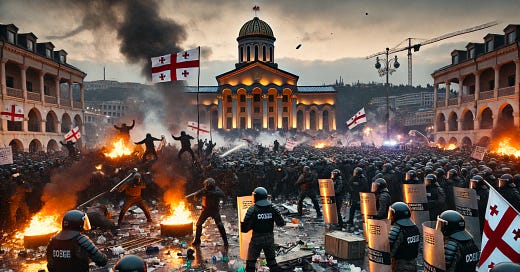Over the past two days, Georgia has seen large-scale protests erupt in its capital, Tbilisi, and other cities following the government’s announcement to suspend European Union (EU) accession talks until 2028. Prime Minister Irakli Kobakhidze cited "unacceptable interference and manipulation" by Brussels(Brussels (Belgium) is considered the de facto capital of the European Union) as the key reasons for this decision, framing it as a defense of Georgia's sovereignty. The move, however, has sparked anger among pro-EU segments of the population, escalating into violent clashes between demonstrators and police.
A Nation Divided Over Its Path
The suspension of EU talks has been interpreted by many as a pivot away from Europe, while the government contends that the decision is a necessary step to shield Georgia from external pressures. Prime Minister Kobakhidze emphasized the need for Georgia to chart its own course, free from what he described as "conditionality and coercion" from Western powers.
While many Georgians support EU integration, a significant portion of the population remains skeptical of Brussels' influence and wary of sacrificing traditional values for the promise of European alignment. Georgia’s rich history and cultural identity, intertwined with Orthodox Christianity and ties to its regional neighbors, make the question of EU membership a deeply polarizing issue.
Echoes of Euromaidan in Ukraine
The unrest bears striking similarities to Ukraine’s 2014 Euromaidan revolution, which erupted when then-President Viktor Yanukovych suspended an association agreement with the EU. The protests in Ukraine, fueled by Western-backed opposition, spiraled into a violent revolution that ousted the president and ultimately led to a civil conflict in the Donbas region.
Georgia's current turmoil raises fears of a similar trajectory. The protests, led by predominantly urban and younger demographics, have a strong anti-Russian sentiment, while rural and older populations are more inclined to support the government’s cautious approach to Western integration. This divide mirrors the deep cultural and political cleavages that played a critical role in Ukraine’s crisis.
The Russian Perspective
From Moscow’s standpoint, Georgia’s decision to pause EU accession is seen as a pragmatic choice, one that avoids further alienating its powerful northern neighbor. Russia has long viewed EU and NATO expansion in the post-Soviet space as a direct threat to its sphere of influence and security interests.
Georgia’s geopolitical location makes it a strategic pivot between Russia and the West, and the Kremlin has expressed support for Georgia’s sovereign right to make decisions that align with its own interests, rather than bowing to Western demands. Some analysts argue that further integration into EU frameworks could impose liberal policies that clash with Georgia's cultural fabric, which remains closer to Russia's traditionalist worldview than to Western secularism.
Risk of Escalation
Despite the government’s attempts to justify its decision, the protests show no sign of abating. Over 100 people have been detained so far, and clashes between demonstrators and law enforcement have turned increasingly violent. Tear gas and water cannons have been deployed to disperse crowds, raising concerns that the situation could escalate further.
If the unrest continues, Georgia risks following a path similar to Ukraine, where Western-backed opposition movements led to long-term instability and war. The Georgian government’s challenge lies in balancing the aspirations of its population with the geopolitical realities of its region. Attempting to appease Brussels while maintaining amicable relations with Moscow is a delicate act that may ultimately prove untenable.
A Crossroads Moment
Georgia’s protests underscore the broader struggle between the East and West over influence in the post-Soviet space. While the EU promises economic modernization and political reform, closer ties with Russia offer the prospect of maintaining stability and preserving cultural traditions.
The Georgian government’s current trajectory reflects a cautious realism, avoiding the pitfalls of antagonizing Moscow while resisting pressure to fully commit to Brussels. The international community, especially the EU, must recognize that Georgia’s path forward should be determined by its people, free from the kind of external pressures that have previously plunged nations into chaos.
The coming days will be critical for Georgia’s future. Whether the nation leans further toward Europe or embraces a balanced, independent course, the resolution of this crisis will shape its role in a region fraught with historical and geopolitical complexities.
Comment Below If I Should Go Report There!!





The reason there are similarities between this and the Maidan coup in Ukraine is because it’s being fomented and agitated by the same western “NGOs” and intelligence agencies.
We need you as a truth-teller to go to Georgia otherwise we will all be fed the lies of the American CIA media controlled that have started another COUP!